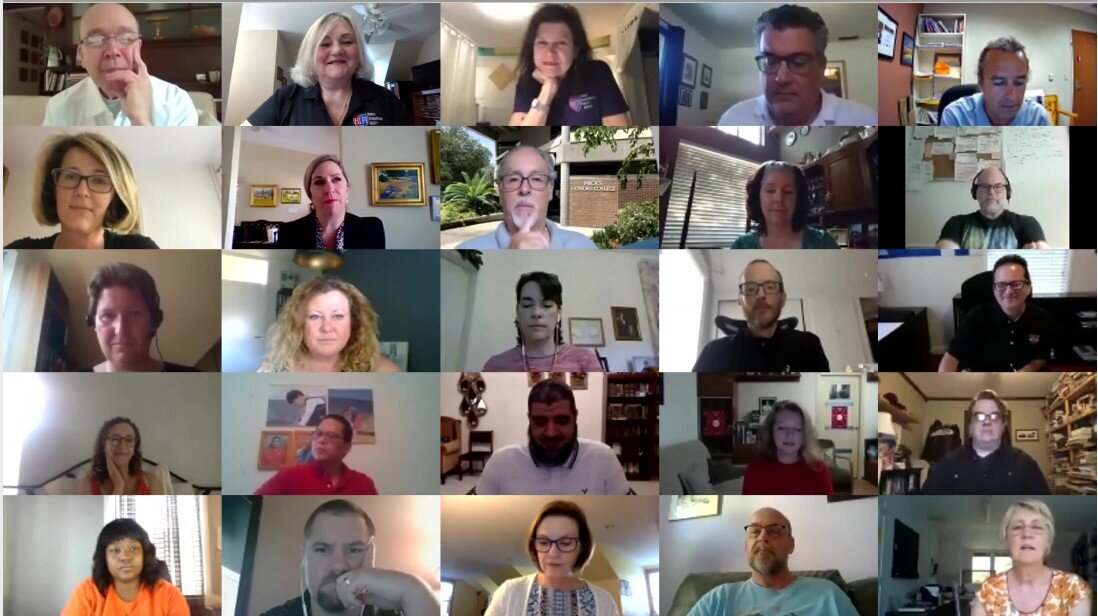HIFLO: Creating Online Community
Check. Online community created.
On June 17, 2020, I attended the Honors International Faculty Learning Online (HIFLO) webinar, “Creating Online Community: Experience from Honors.” The interactive session was moderated by the HIFI group: Drs. Marca Wolfensberger, John Zubizarreta, and Beata Jones, and I was delighted to see at least three of my colleagues from HIFI 2019. In advance of the session, we were asked to review three short videos available through the European CoTalent Project.
The first of the videos, “Create and Atmosphere in which Students Learn from Each Other,” was especially rich. The presentation focused on creating patterns of communication that emphasize mutual benefit. I was immediately drawn to the “I like this about that” approach to feedback, emphasizing the benefits of a given member’s position rather than its limitations, and seeking out colleagues’ strengths and/or potential. I would like to build a culture around these concepts, not only in the classroom, but in our departmental governance.
The second video, “How to Stimulate Students to Play and Active Role in the Academic Community,” was more challenging. I recently completed a self-assessment through the Co-Talent website that suggested I could work on taking more of a “leadership as co-invention” strategy, and this presentation spoke to that. The presenters outlined three strategies in particular: broadening your academic network, making learning materials, and expanding research knowledge. Taking them in reverse order, I have the most experience with the last; I allow students considerable autonomy in their research projects, have occasionally placed students at regional conferences, and recently started exploring the idea of a collaborative project. The second item involved having the students create a textbook or website covering the material of the course. While I think this might be somewhat ambitious, I am attracted to the translation task involved, and given a narrow enough topic I would be willing to give it a go. The first item was the most radical, and in some ways the most interesting. Here, the students would locate an expert in the field outside of my professional network, and then set up a lecture or debate involving them. The more I unpack this idea, the more benefits I see, even if the experience is negative. If, for example, the person they locate is too busy, demands a fee, is dismissive, etc. the lesson in working with professionals would be as valuable as the insights they might have brought. It creates a wonderful “teachable moment”: Is what they were asking a reasonable request? What other compensation might be available? How does one respond to unprofessional behavior?
The third video, “How to Stimulate Students to Play an Active Role in Society,” profiled a group of students who were bothered by the negative image of higher education they saw in the media. In response, they created an apologetic podcast describing their positive experiences and showcasing the benefits of their academic programs. What I took from this was the institution’s willingness to create space for a student-driven project, and through faculty mentoring, encourage critical reflection and communication skills. Again, it reinforced the idea of “leadership as co-invention.”
The live session was full of energy and good humor. Humor, in fact was one of the threads that ran through the program. Dr. Jones drew attention to three areas of 21st century learning that related to community: relationships, collaboration, and “students as partners.” Building relationships in an online environment is a particular challenge, and many of the strategies for connecting students were intended for synchronous instruction. I had actually avoided this during the COVID-19 crisis, mainly because the students were already under stress and many of them had limited internet access, family responsibilities, etc. In the breakout group, I found out that at least one of my colleagues had made the same decision. The information was still valuable, however, and I realized that while I had made an effort to contact my students regularly, and include space for both grief and silliness, I had missed some crucial opportunities.
One of the highlights of the session was the demonstration of Mentimeter, an online polling platform that could display responses in a variety of striking visualizations. Dr. Zubizarreta also spoke to the importance of health and wellness, focusing on the benefits of physical activity in learning. He ran us through a short neck stretch toward the end of the session that I appreciated.
The HIFI group practices what they preach, and at the conclusion of the webinar we were invited to a Slack group, where the resources of the session have been made available. I plan to take advantage of this by following up with several of the participants, some of whom were in the region and had specialties in the arts and Asian studies.
